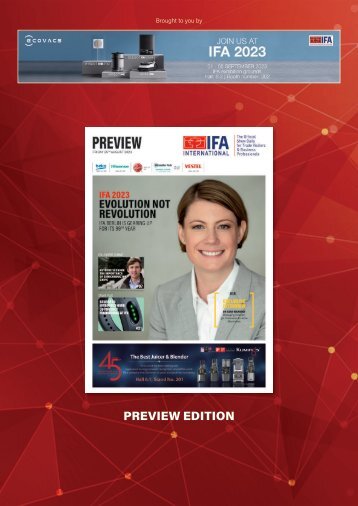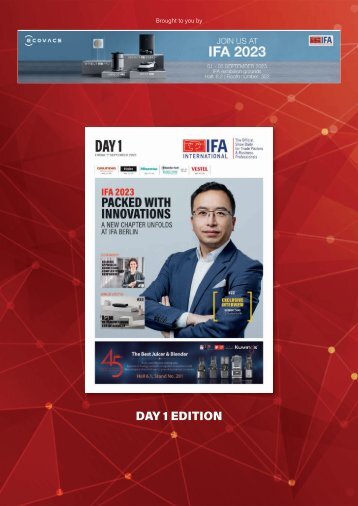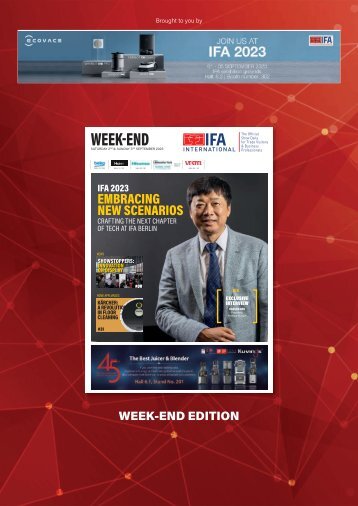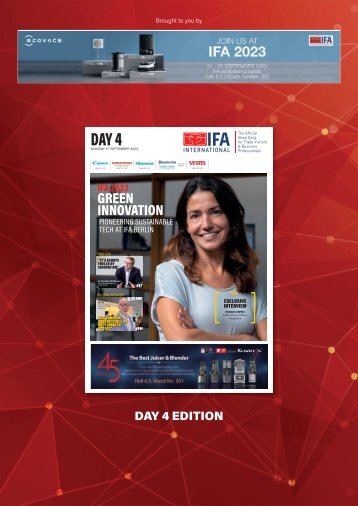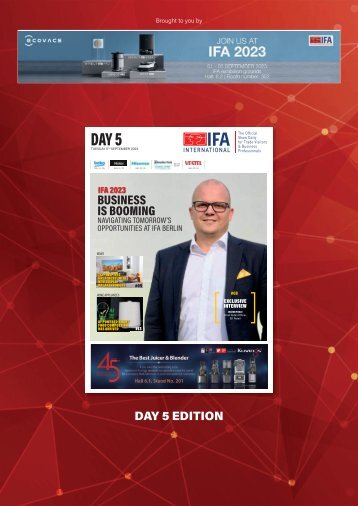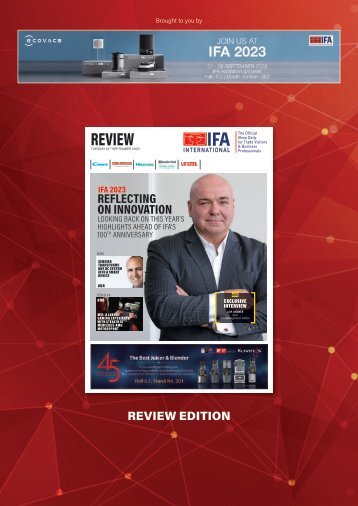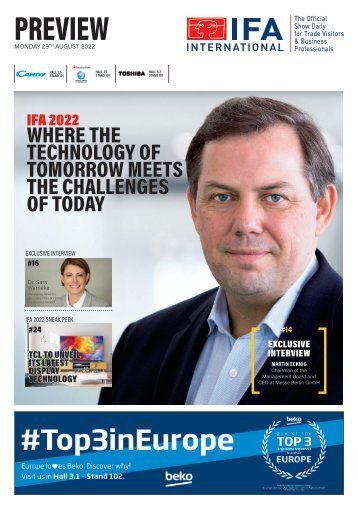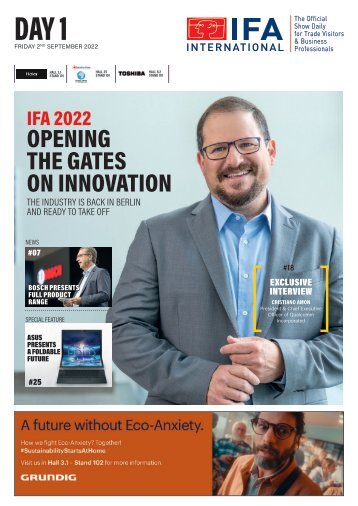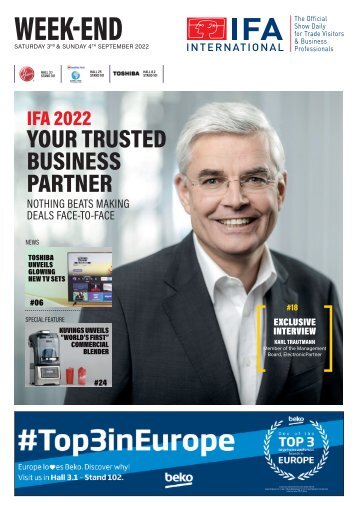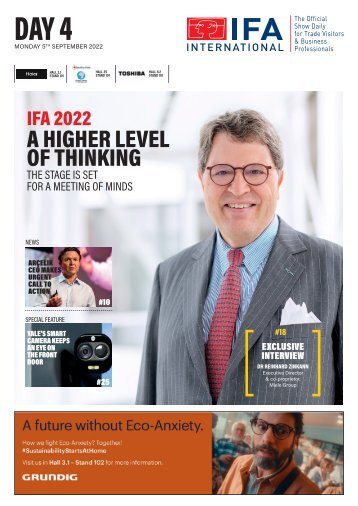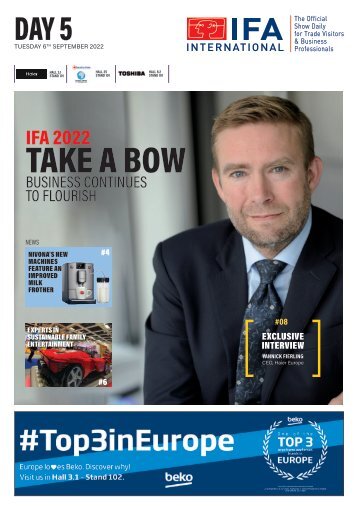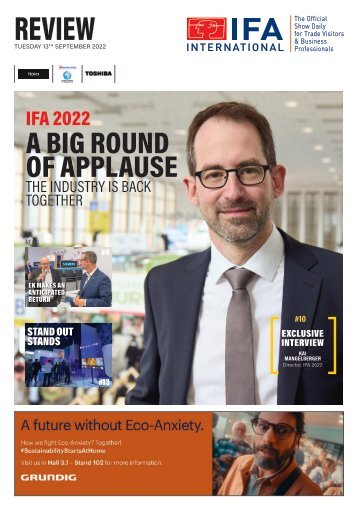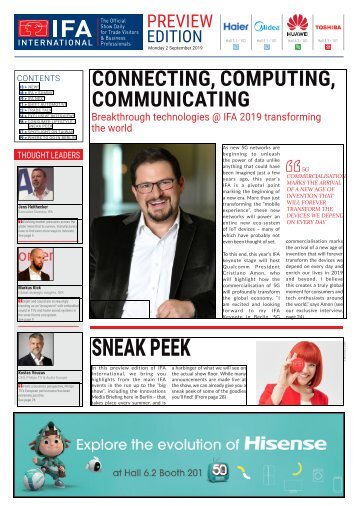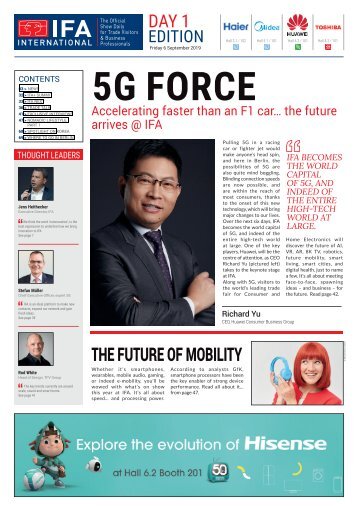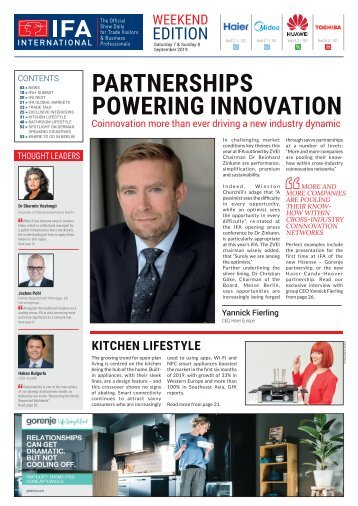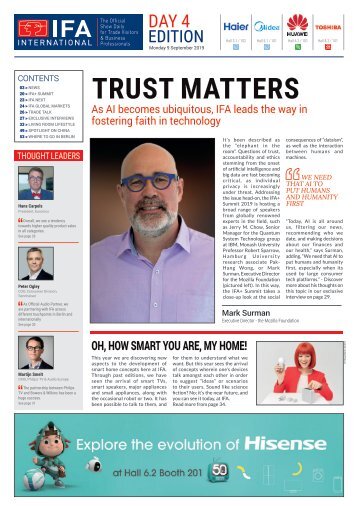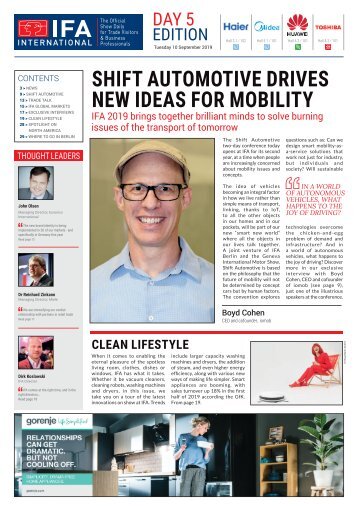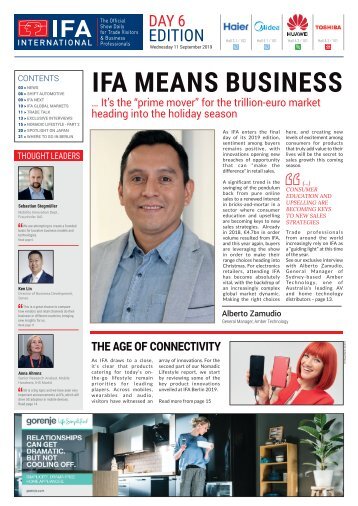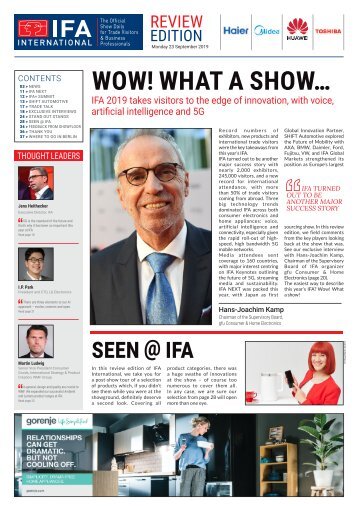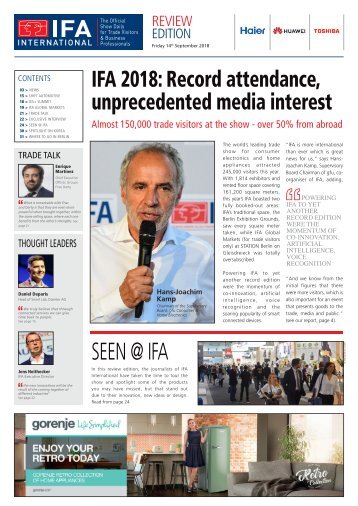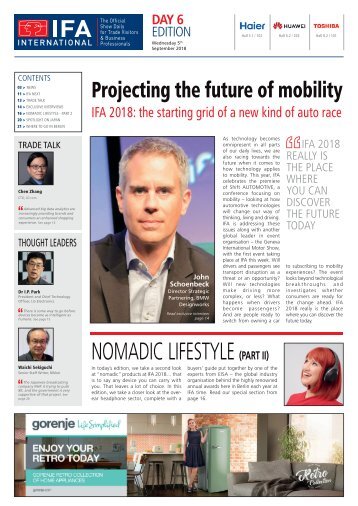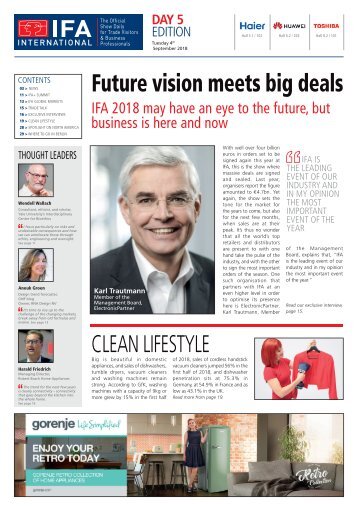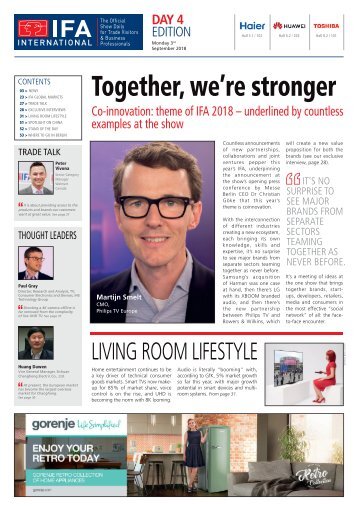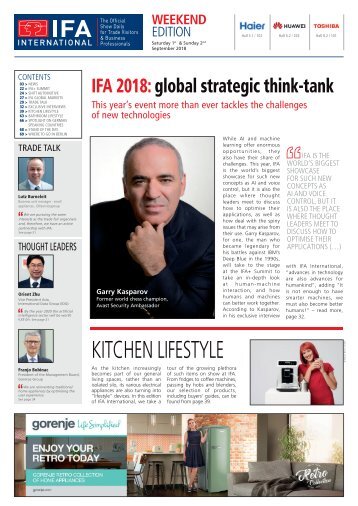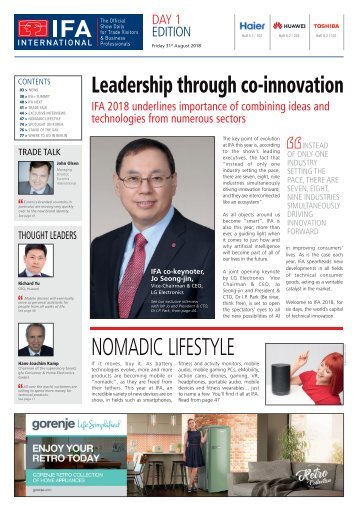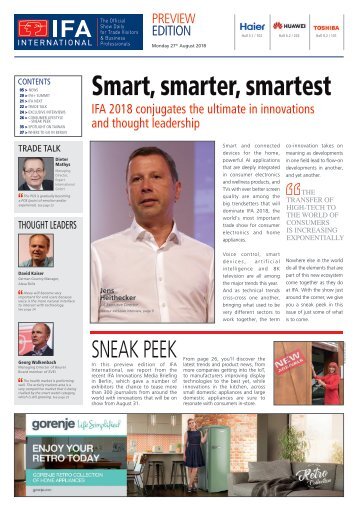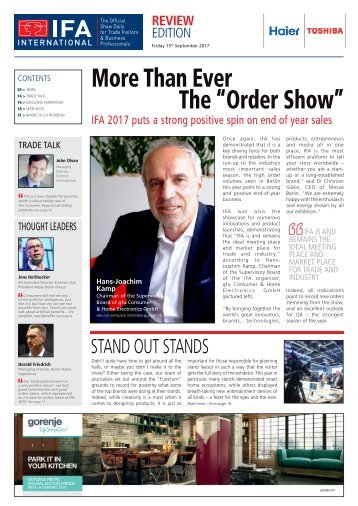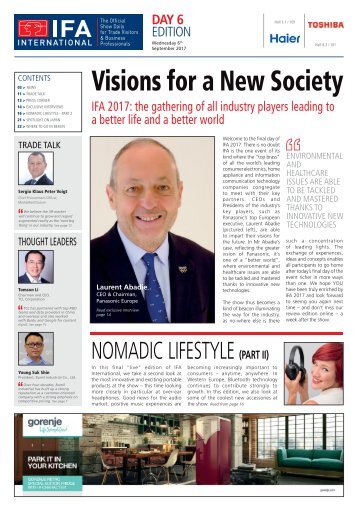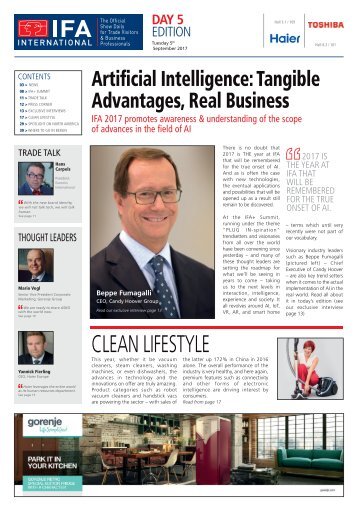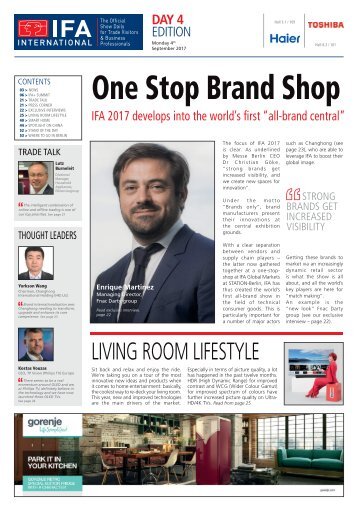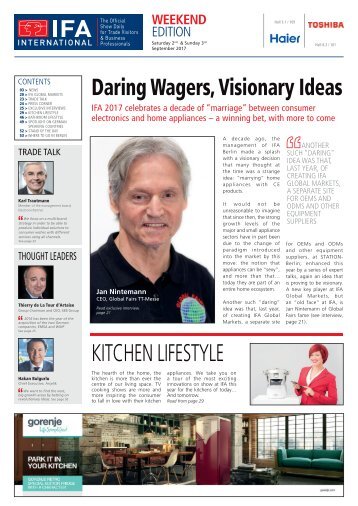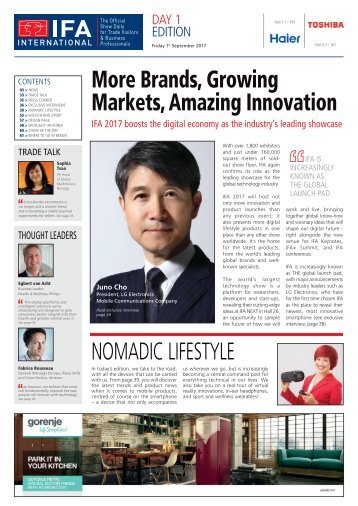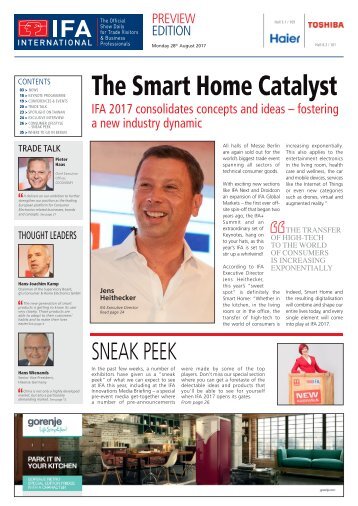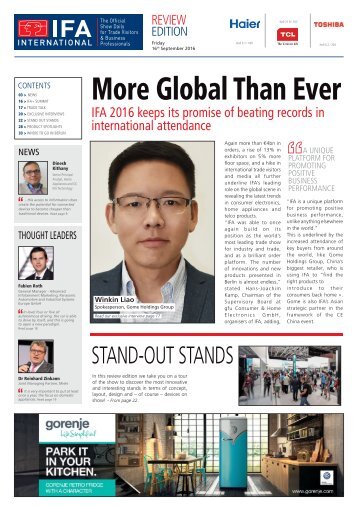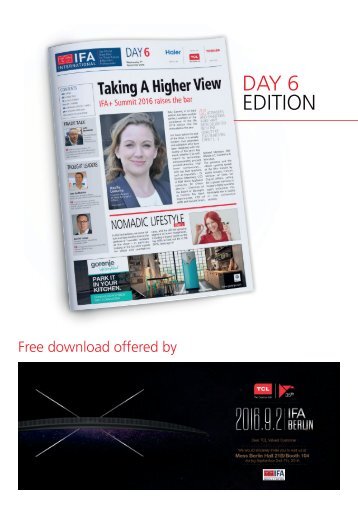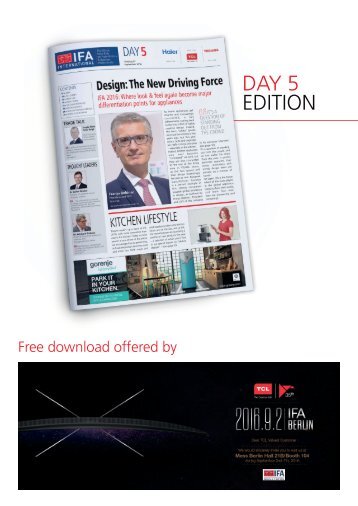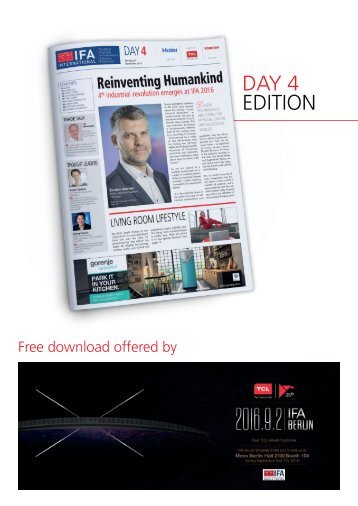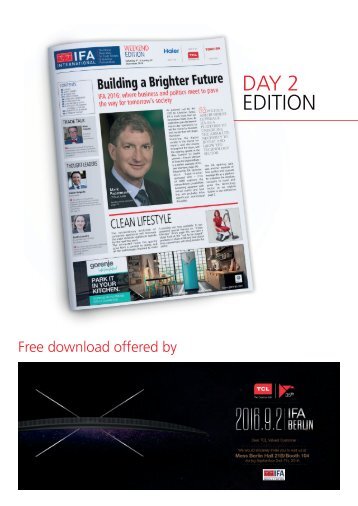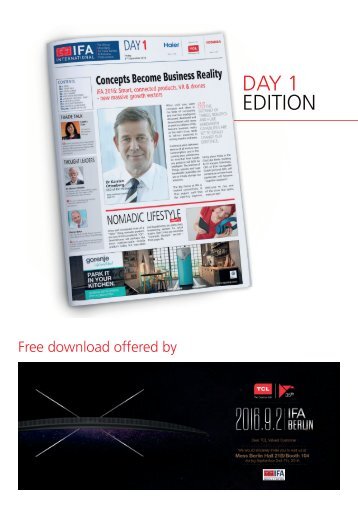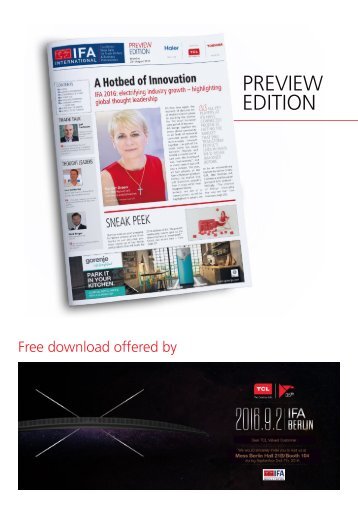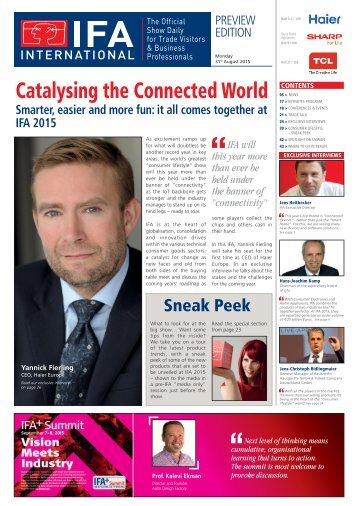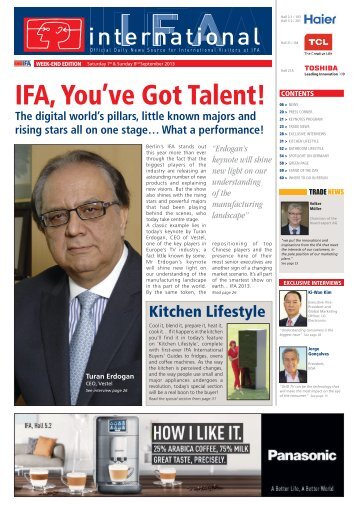
Week-end Edition - Day 2 & Day 3 - IFA International
- Text
- Products
- Appliances
- Berlin
- September
- Consumer
- Devices
- Global
- Content
- Consumers
- Manufacturers
Exclusive Interview BSH
Exclusive Interview BSH takes green mainstream Dr Gutberlet outlines the mass-market challenge Dr Kurt-Ludwig Gutberlet, Chairman of the Board of Management and CEO of BSH Bosch und Siemens Hausgeräte, will be tackling one of hottest issues in home appliances in this keynote this afternoon: how to transform eco-friendly appliances into mass-market propositions. That the democratisation process has already started can be seen in the sales of BSH’s ‘super-efficient’ products, which have tripled during the recent downturn. So where next for the German domestic-appliances powerhouse? By Joanna Stephens In 2009 we benefited particularly from the fact that we were quick to recognise the increasing consumer demand for energy-efficient home appliances, which developed into a mega-trend last year. Our range of superefficient appliances allowed us to benefit tremendously: in 2009, super-efficient appliances represented 15% of BSH sales in Europe. The challenge now is to bring these products to the mass market – which is what we intend to do. But of course, this won’t happen overnight. In 2010, our aim is to increase the share of these eco-friendly appliances to 20% of our total sales in Europe. How much further can we go in energy and water economy in terms of kitchen and laundry appliances? Technology has enabled the home-appliances industry to launch a range of products that save energy in an unparalleled way. Thanks to modern appliances, we can now save up to 70% of the electricity we used in 1995. Certainly, in many cases, the product concepts are fully developed, so the further reduction of consumption values is only possible in small steps. Our engineers are constantly working to create solutions to reduce the consumption of energy and water. And they continue to set standards, as is demonstrated by the Zeolith drying system for dishwashers and our heatpump technology for tumble dryers. The inclusion of appliances in intelligent networks, or ‘smart grids’, appears to be a major topic at the moment — and one that you are addressing in your keynote. How far along the track are we with this? In the past few weeks, there has been a certain euphoria in the media about smart grids, which we do not entirely share, because we believe one needs to look clearly at the role of home appliances in the intelligent electricity network. Smart grids are not predominantly about saving energy. Instead, the focus lies on the ideal allocation of the available energy and the improved integration of renewable sources of energy. Numerous studies show that the contribution of home appliances to this is marginal. Our focus therefore lies on the energy efficiency of home appliances. However, the smart grid is an important subject for the future, and will become part of our productdevelopment process. As soon as the prerequisites for a functioning smart grid have been created, we will launch smart gridcompatible products that will offer consumers genuine benefits. Despite the financial crisis, you performed strongly in 2009. Looking forward, what’s the prognosis? The economic crisis hit our industry much less severely than it did many others. Some markets suffered, but there were also others — Germany, for example — where our performance was very positive and where our efforts in energy-efficiency paid off, and continue to do so. For 2010, we anticipate a stabilisation of the home-appliances market worldwide. In almost all markets, we intend to make full use of the increasingly strong demand for lowconsumption appliances. We also hope to benefit from the predicted growth in Eastern Europe and Asia, where we already hold strong market positions. Generally speaking, we are expecting our revenue to grow in 2010 at a rate somewhere between 5% and 10%. While some Asian manufacturers are working hard to move into Europe, BSH has successful pushed into Asia. How did you achieve that? Our early commitment to the Asian market paid off in 2009. In China, we are now manufacturing home appliances in six factories at three locations, having opened a new washingmachine factory in Nanjing in 2009. In fiscal 2009, we were able to increase our revenue by almost 26%. And in Hong Kong, Thailand, Singapore and Malaysia, our business moved well into positive territory. What, for you, are the market sweet spots, both geographically and in terms of product categories? We will continue to emphasise energy-efficiency in all product categories. We will launch energy champions, particularly in the area of refrigerators, washing machines and dishwashers. We are optimistic that all the markets in which BSH operates will now start to pick up. And we expect the highest growth to be in China. BSH’s Dr Kurt-Ludwig Gutberlet: “the highest growth will be in China” “In almost all markets, we intend to make full use of the increasingly strong demand for low-consumption appliances.” 20
Official Daily Video Source for International Visitors at IFA Exclusive Interview The smartest way to handle change Time to ‘rethink innovation’, urges IBM’s Michael Rhodin Michael Rhodin believes the CE industry needs to get smarter. In today’s keynote, the Senior Vice-President of IBM Software Solutions Group will examine the products and services that are transforming the CE landscape — and how executives will need to adapt to cope with the changes ahead… IBM Software Solutions’ Michael Rhodin: “positioned for the service economy of the 21 st century” Over the last few years, IBM has conducted biennial surveys of CEOs. This is an opportunity to find out what is on the minds of senior executives around the world. The most recent study was based on interviews with over 1,500 CEOs from 60 countries and 33 industries. It revealed that more than 60% of CEOs believe industry transformation is the top factor contributing to uncertainty. So the CE industry is not alone in facing the challenges inherent in industry transformation. What is at the heart of this transformation? I believe it’s the shift from selling stand-alone products to selling products plus consumer-oriented services. This addresses not only the ability to better manage devices via a connected state, but it also allows the safe sharing of content, services and information across device types. For many decades, CE companies have made a living designing, manufacturing and shipping products into the retail channel, never to hear from them again. But times have changed. Consumers not only want to be dazzled by cool devices – they also want intuitive, intelligent devices that enhance their personalised digital lifestyle. As companies shift to a service-oriented model, they will need to find new ways of working together. How should electronics companies be dealing with these changes? To meet these challenges, CE manufacturers must rethink the way they innovate. They must deliver products and services that leverage the Internet to collect and analyse data and create new value. They must foster new and direct relationships with their customers. They must be able to protect consumer privacy. And most importantly, they must recognise that their products are part of a broader ecosystem – a socalled ‘Internet of things’. Where do the opportunities lie? As products become increasingly instrumented, interconnected, intelligent and plugged into, for example, a cloud-based service infrastructure, a service-delivery platform can enable manufacturers to maintain a direct, continuous, 24/7 connection to the end-user through smarter products. They can collect and aggregate customer-usage data, to understand how a product is being used and how to use that information to tighten their operations. They can also collect and manage information and preferences through a service-catalogue user portal.. How is IBM benefiting from these changes? Years ago, we remixed our portfolio toward services, software and solutions. We invested in offerings that fostered communications between our clients and our company. We embraced open standards to allow for a stronger, more dynamic IT industry. These shifts not only pulled our business from the grips of commoditisation, but they also positioned us well for the service economy of the 21 st century. That same transformation is what’s required for CE companies today. We believe that we are well-positioned to be the ‘enabler’ of this transformation. By combining our system knowledge, our embedded software capabilities, our consulting experience, our strength in cloud computing and our industry and valuechain expertise, we are already working with our clients to rethink the way they approach product and service innovation. We can assist our clients to build smarter innovation capabilities. We also have the technological capabilities. At IFA, we are showcasing a cloud-based service-delivery platform that enables the integration and management of services. This allows CE manufacturers to plug their devices into an open standards-based environment, using IBM’s scalable infrastructure. “CE manufacturers must recognise that their products are part of a broader ecosystem” REPORTS ON ASTRA 3D For the first time, news from IFA Berlin will be broadcast via satellite in glorious 3D! IFA International TV – official TV producers of the IFA show (run by IFA International – the Daily) and ASTRA have partnered to bring exclusive video highlights from IFA to households and retail outlets across Europe on the ASTRA 3D Demo Channel. Filming and editing IFA International TV in 3D is supported by Panasonic, a worldwide leader in 3D cameras and televisions. Tune in… … every day, every 2 hours starting from 10 a.m. on the ASTRA 3D Demo Channel Start of programme: 3rd September End of programme: 18th September For satellite details: www.ses-astra.com IFA international TV www.ifa-international.org IFA International • Saturday, 4 th & Sunday, 5 th September 2010 21
- Page 1 and 2: WEEK-END EDITION international Offi
- Page 3 and 4: News international Official Daily N
- Page 5: News Never mind the platform, feel
- Page 9: News ShowStoppers @ IFA 2010 The th
- Page 12 and 13: A well-informed buyer is less likel
- Page 14 and 15: News Dolby brings high-quality soun
- Page 17 and 18: Markets & Technology Trends TV ship
- Page 19: Exclusive Interview your world blue
- Page 23 and 24: Exclusive Interview bidet / toilet
- Page 25 and 26: HALL PLAN www.ifa-international.org
- Page 27 and 28: Hall 22 - Stand 101 Hall 5.2 - Stan
- Page 29 and 30: Special Feature The Smart Home Ever
- Page 31 and 32: Special Feature The Smart Home Inte
- Page 33 and 34: Special Feature The Smart Home The
- Page 35 and 36: Special Feature Small Appliances Ha
- Page 37 and 38: Special Feature Small Appliances Co
- Page 40 and 41: SWITCH ON START SAVING Philips Ener
- Page 43 and 44: Trade News Network salesmen write t
- Page 45 and 46: Trade News Reseller Park reaps bene
- Page 47 and 48: HOTELS / BARS / RESTAURANTS WHERE T
- Page 49 and 50: WHERE TO GOIN BERLIN International
Inappropriate
Loading...
Mail this publication
Loading...
Embed
Loading...

IFA International
- IFA International 2023
- IFA International 2022
- IFA International 2020
- IFA International 2019
- IFA International 2018
- IFA International 2017
- IFA International 2016
- IFA International 2015
- IFA International 2014
- IFA International 2013
- IFA International 2012
- IFA International 2011
- IFA International 2010
- IFA International 2009
- IFA International 2008
- IFA International 2007
